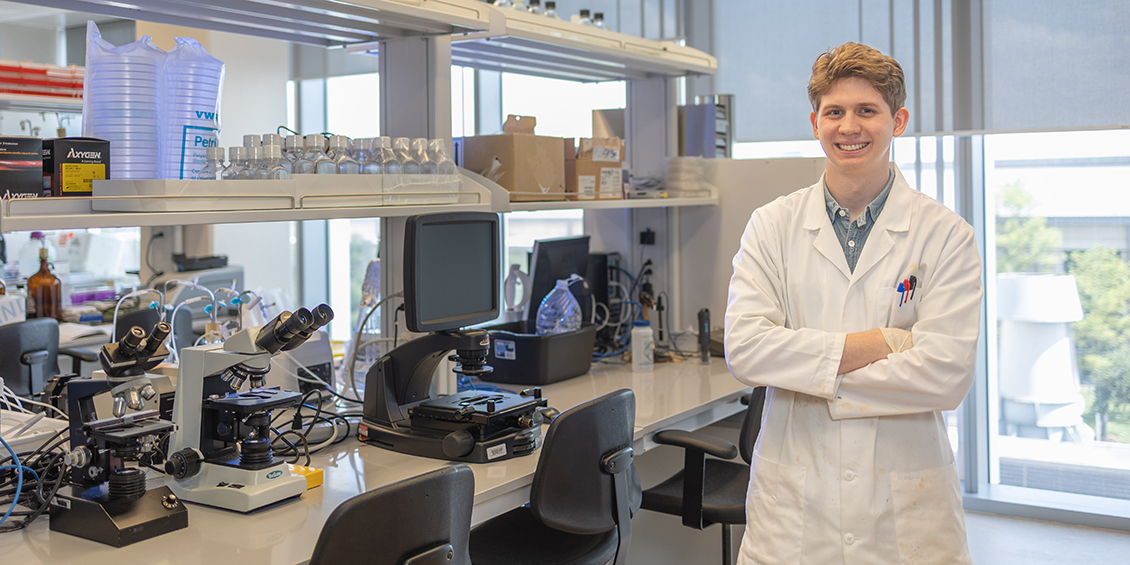Student Feature: Cole Hudson, B.S. (’21), Ph.D. Student
 Moving the Needle
Moving the Needle
UH Honors College Alumnus, Pharmaceutical Sciences Ph.D. Student Discovers New Therapeutic to Reduce Antibiotic-associated Kidney Injury
By Kristin MitchenerIn college lecture halls, libraries and laboratories across the nation, exciting scientific discoveries are being made every day that are, quite literally, changing the lives of patients across the globe. Scientist-in-training and University of Houston (UH) Honors College alumnus Cole Hudson, B.S. ('21), has recently made one such discovery.
A current Pharmaceutical Sciences Ph.D. student in the UH College of Pharmacy, Hudson has spent the last few years exploring drug mechanisms to reduce the kidney toxicity of antibiotics. An author/contributor on five published papers already, Hudson's scholarly journey has been on the fast track to the laboratory since his undergraduate days as a biochemistry major.
Entering the Honors College as a freshman, Hudson already had graduate school on his mind.
"I appreciated many attributes of UH, especially it being a Tier 1 research university and its proximity to the Texas Medical Center," Hudson said. "I chose the Honors College to make myself a standout candidate for graduate/professional school, and the quality of honors science courses was incredibly high."
At home in the lab
A self-professed bookworm, Hudson spent his first two years at UH focusing on earning exceptional grades. Originally considering medical school, Hudson realized early as an undergraduate that he would prefer to work at the bench instead of at the bedside.
"I got drawn into the science aspect as opposed to the patient-facing aspect," Hudson said. "I liked being in the lab, working with cool equipment and making exciting discoveries. I decided I’m better suited for bench science, and I’m really glad I chose that route."
Honoring his calling, Hudson’s junior year arrived and he was ready to take his research experience to the next level. Hudson emailed a handful of UH professors who were research investigators, and credits one professor’s enthusiastic response for setting him on his current research path. The email reply came from Vincent H. Tam, Pharm.D., FIDSA, BCIDP, a professor in the departments of Pharmacy Practice & Translational Research and Pharmacological & Pharmaceutical Sciences.
"I really liked Dr. Tam’s focus on doing translational research and bringing his findings to the clinic as fast as possible to provide new treatment options quickly," Hudson said.
Tam brought on Hudson as a laboratory volunteer where Hudson was exposed to a plethora of laboratory techniques and equipment. Desiring experience in conducting his own independent research project, Hudson applied for and received a competitive UH Summer Undergraduate Research Fellowship (SURF) in 2020 as a rising senior.
Finding purpose in repurposed drug
Under the guidance of Tam, Hudson investigated the activity of enzymes that highly drug-resistant bacteria utilize to break down beta-lactam antibiotics, such as penicillin. Now an experienced laboratorian, Hudson was hired by Tam to serve as a research assistant during his senior year where he continued to improve his skills in the lab, help guide Tam's experiments, and learn how to plan and interpret his own experiments independent of Tam. Upon graduating summa cum laude with a B.S. in biochemistry, Hudson entered the UHCOP Ph.D. program’s Concentration in Pharmaceutics and continues to study under Tam.
"My particular interest is in antibiotic resistance and how the bacteria can become resistant to new antibiotics, specifically the biochemistry behind that," Hudson said.
It’s his keen interest and tenacity in building research experience that led to Hudson’s major drug discovery.
Upon experimenting with various drugs to counteract the kidney damage often caused by antibiotics, Hudson and Tam discovered that the asthma therapeutic zileuton has protective properties against antibiotic-associated kidney injury. While currently being studied in animal models, this drug discovery could very well be translated to humans in the future. Initial results of their research was published in the Journal of Antimicrobial Chemotherapy.
"I don’t see the work I’m doing as benefiting patients right now," Hudson said. "Dr. Tam often uses the phrase 'moving the needle.' The contributions I'm making right now, the next person can pick that up and make their contributions, and then hopefully when enough people do that, there's something tangible that can actually help people."
Discovery and debate
So, why does an asthma medicine protect the kidneys? Hudson and Tam enjoy spirited debates around this very question.
"We don’t know yet," Hudson said. "The mechanism behind why a drug has certain properties is a lot harder to find out. Dr. Tam and I actually disagree on the reason. I postulate it’s because of the drug’s anti-inflammatory properties, while Dr. Tam believes it’s due to autophagy activation."
While Hudson may see himself as simply "moving the needle," it could very well be said that Hudson is dismantling the whole haystack. Hudson recently presented a poster on zileuton reducing antibiotic kidney injury at IDWeek 2023, the joint annual conference hosted by several high-profile infectious diseases societies and associations, where Hudson met several established fellow scientists and learned about new cutting-edge antimicrobials.
Hudson is seeking internships to get his foot in the door with the goal of continuing to work in the laboratory setting, ideally for a large, well-established organization in the pharmaceutical industry, following graduating from the Ph.D. program.
With Hudson on the move and bacteria on the run, this scholarly journey is certainly one to follow.